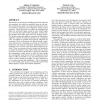Free Online Productivity Tools
i2Speak
i2Symbol
i2OCR
iTex2Img
iWeb2Print
iWeb2Shot
i2Type
iPdf2Split
iPdf2Merge
i2Bopomofo
i2Arabic
i2Style
i2Image
i2PDF
iLatex2Rtf
Sci2ools
SIGECOM
2000
ACM
2000
ACM
Competitive bundling of categorized information goods
We introduce an information bundling model that addresses two important but relatively unstudied issues in real markets for information goods: automated customization of content based on categories, and competition among content providers. Using this model, we explore the strategies that sellers (or automated agents acting on their behalf) might use to set both price and bundle composition, and the market dynamics that might ensue from such strategy choices. The model incorporates di erent categories of information, explicitly accounts for nite production and consumption costs, and allows for possibly heterogeneous valuations by consumers. First, we determine the optimal bundle composition and price for a monopolist as a function of the seller's production costs and the consumers' preferences and consumption costs. For nite costs, nite-sized bundles are optimal. Then, we use game-theoretic analysis and simulation to explore the behavior of the market when there are multiple ...
| Added | 01 Aug 2010 |
| Updated | 01 Aug 2010 |
| Type | Conference |
| Year | 2000 |
| Where | SIGECOM |
| Authors | Jeffrey O. Kephart, Scott A. Fay |
Comments (0)

